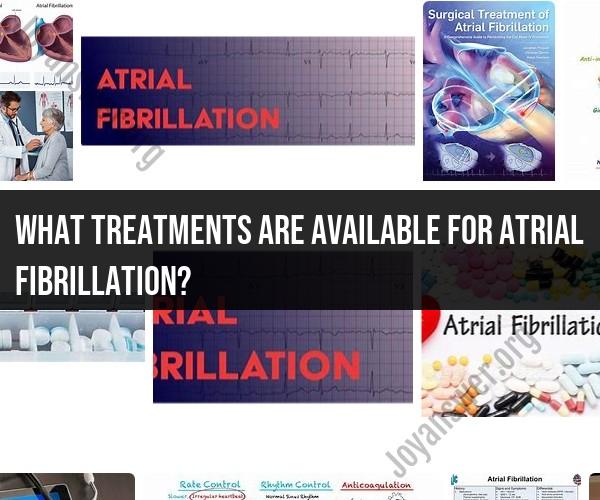What treatments are available for atrial fibrillation?
Atrial fibrillation (AFib) is a heart condition characterized by irregular and often rapid heartbeats. Treatment options for atrial fibrillation aim to control the heart's rhythm, prevent blood clots, and reduce the risk of complications. The choice of treatment depends on the type of AFib, its severity, and individual patient factors. Here is a comprehensive overview of treatment options for atrial fibrillation:
Lifestyle Modifications:
- Diet and Exercise: Maintaining a healthy diet and regular exercise can help manage AFib risk factors, such as obesity and high blood pressure.
- Alcohol and Caffeine: Reducing or eliminating alcohol and caffeine intake can help some individuals manage AFib symptoms.
Medications:
- Antiarrhythmic Medications: These drugs help regulate the heart's rhythm and can be used to convert AFib to normal sinus rhythm. Examples include amiodarone, flecainide, and propafenone.
- Rate-Control Medications: These medications slow down the heart rate to a more normal range. Beta-blockers (e.g., metoprolol) and calcium channel blockers (e.g., diltiazem) are commonly used.
- Anticoagulants (Blood Thinners): Anticoagulant medications, such as warfarin, dabigatran, apixaban, and rivaroxaban, reduce the risk of blood clots and stroke associated with AFib.
Cardioversion:
- Electrical Cardioversion: In this procedure, an electric shock is delivered to the heart to restore normal rhythm in individuals with persistent AFib.
- Chemical Cardioversion: Medications like amiodarone can be used to attempt to restore normal rhythm.
Catheter Ablation:
- Catheter ablation is a minimally invasive procedure in which a catheter is inserted into the heart to destroy or isolate the areas responsible for abnormal electrical signals that cause AFib. It can be considered for individuals who do not respond to medication.
Surgical Maze Procedure:
- The Maze procedure is a surgical technique that creates a pattern of scar tissue in the atria to redirect the electrical signals and restore normal rhythm. It is typically performed during open-heart surgery.
Left Atrial Appendage Closure (LAAC):
- LAAC is a procedure that seals off the left atrial appendage, which is a common site for blood clot formation in AFib patients. This reduces the risk of stroke and eliminates the need for long-term blood thinners in some cases.
Watchman Device:
- The Watchman device is implanted in the left atrial appendage to prevent blood clots from forming and reduce the risk of stroke.
Pacemaker:
- In some cases, a pacemaker may be implanted to control the heart rate and rhythm in individuals with certain types of AFib.
Stroke Prevention:
- Stroke prevention is a crucial aspect of AFib treatment. Anticoagulant medications are prescribed to reduce the risk of stroke, especially in individuals with certain risk factors.
Hybrid Procedures:
- Some individuals with complex AFib may undergo hybrid procedures that combine surgical and catheter-based approaches for rhythm control and stroke prevention.
The choice of treatment for atrial fibrillation should be made in consultation with a healthcare provider based on the individual's specific condition, symptoms, and risk factors. Treatment plans may involve a combination of medications, procedures, and lifestyle modifications to effectively manage AFib and reduce the risk of complications.
Unmasking Atrial Fibrillation Treatments: Your Comprehensive Guide
Atrial fibrillation (AFib) is a heart condition that causes an irregular and often rapid heart rate. It is the most common type of arrhythmia, or abnormal heart rhythm. AFib can increase the risk of stroke, heart failure, and other serious health problems.
There are two main goals of AFib treatment: to control the heart rate and reduce the risk of stroke. Treatment options include medications, procedures, and lifestyle changes.
Medications
Medications are the most common treatment for AFib. They can be used to control the heart rate and reduce the risk of stroke.
- Heart rate control medications: These medications help to slow down the heart rate. Examples include beta blockers, calcium channel blockers, and digoxin.
- Anticoagulants: These medications help to prevent blood clots from forming. Examples include warfarin, dabigatran, rivaroxaban, apixaban, and edoxaban.
Procedures
Procedures may be recommended for people who do not respond well to medications or who have a high risk of stroke.
- Cardioversion: This procedure uses an electrical shock to restore the heart to a normal rhythm.
- Ablation: This procedure uses heat or cold energy to destroy small areas of tissue in the heart that are causing the abnormal heart rhythm.
Lifestyle changes
Lifestyle changes can help to reduce the risk of AFib and improve overall health.
- Maintain a healthy weight: Being overweight or obese increases the risk of AFib.
- Eat a healthy diet: Eating a diet that is low in salt and saturated fat and high in fruits, vegetables, and whole grains can help to reduce the risk of AFib and other heart diseases.
- Exercise regularly: Exercise helps to strengthen the heart and improve cardiovascular health.
- Limit alcohol intake: Alcohol can trigger AFib episodes.
- Manage stress: Stress can worsen AFib symptoms. Stress management techniques, such as relaxation exercises and meditation, can help to improve AFib outcomes.
Choosing the right treatment for you
The best treatment for AFib depends on a number of factors, including the severity of your condition, your overall health, and your lifestyle. It is important to talk to your doctor about the best treatment options for you.
Conclusion
AFib is a serious heart condition, but there are a number of effective treatments available. Medications, procedures, and lifestyle changes can all help to manage AFib and reduce the risk of complications. If you have AFib, it is important to work with your doctor to develop a treatment plan that is right for you.













